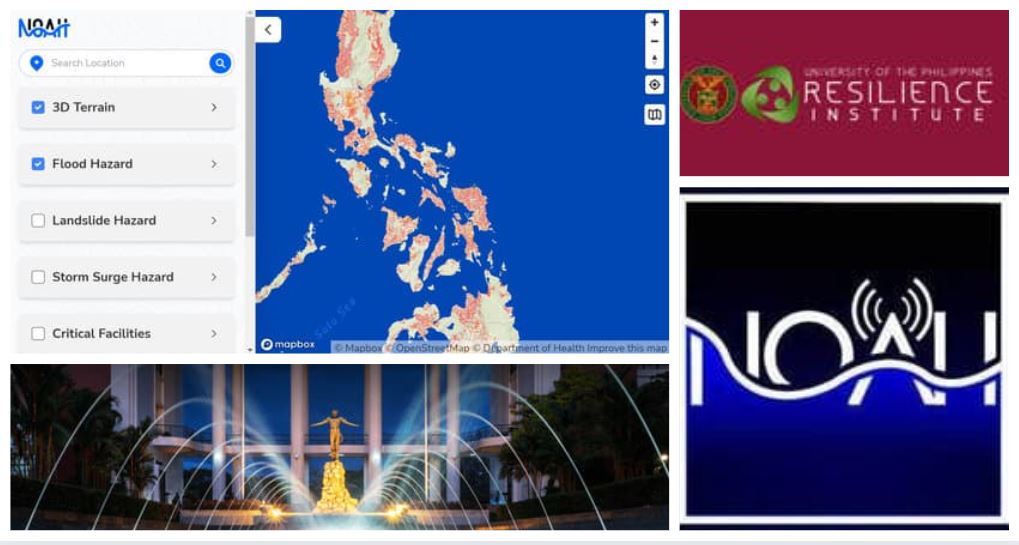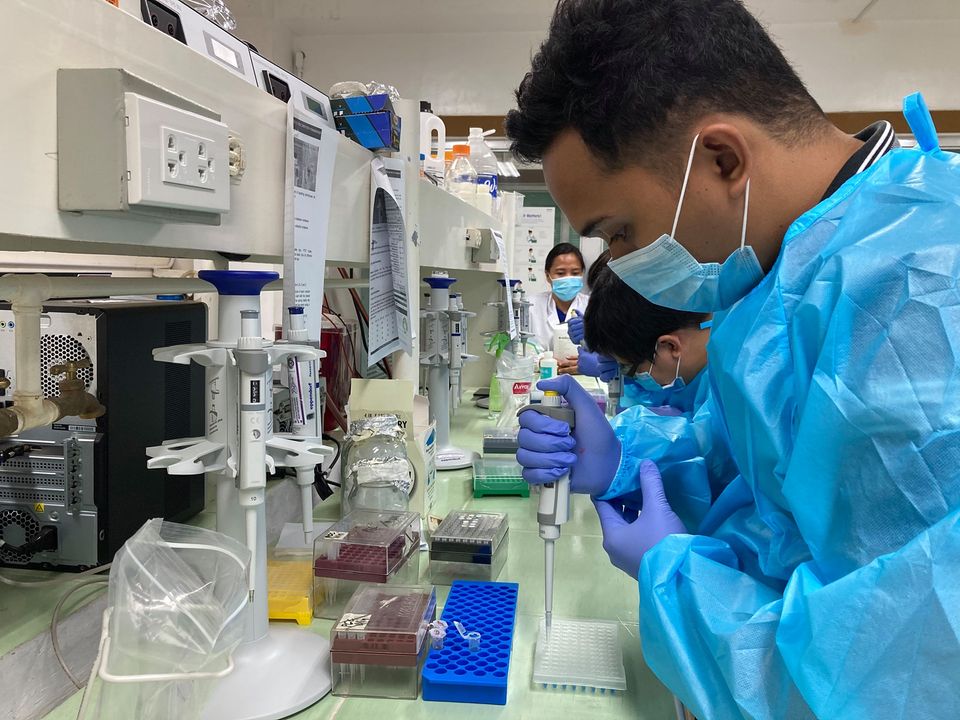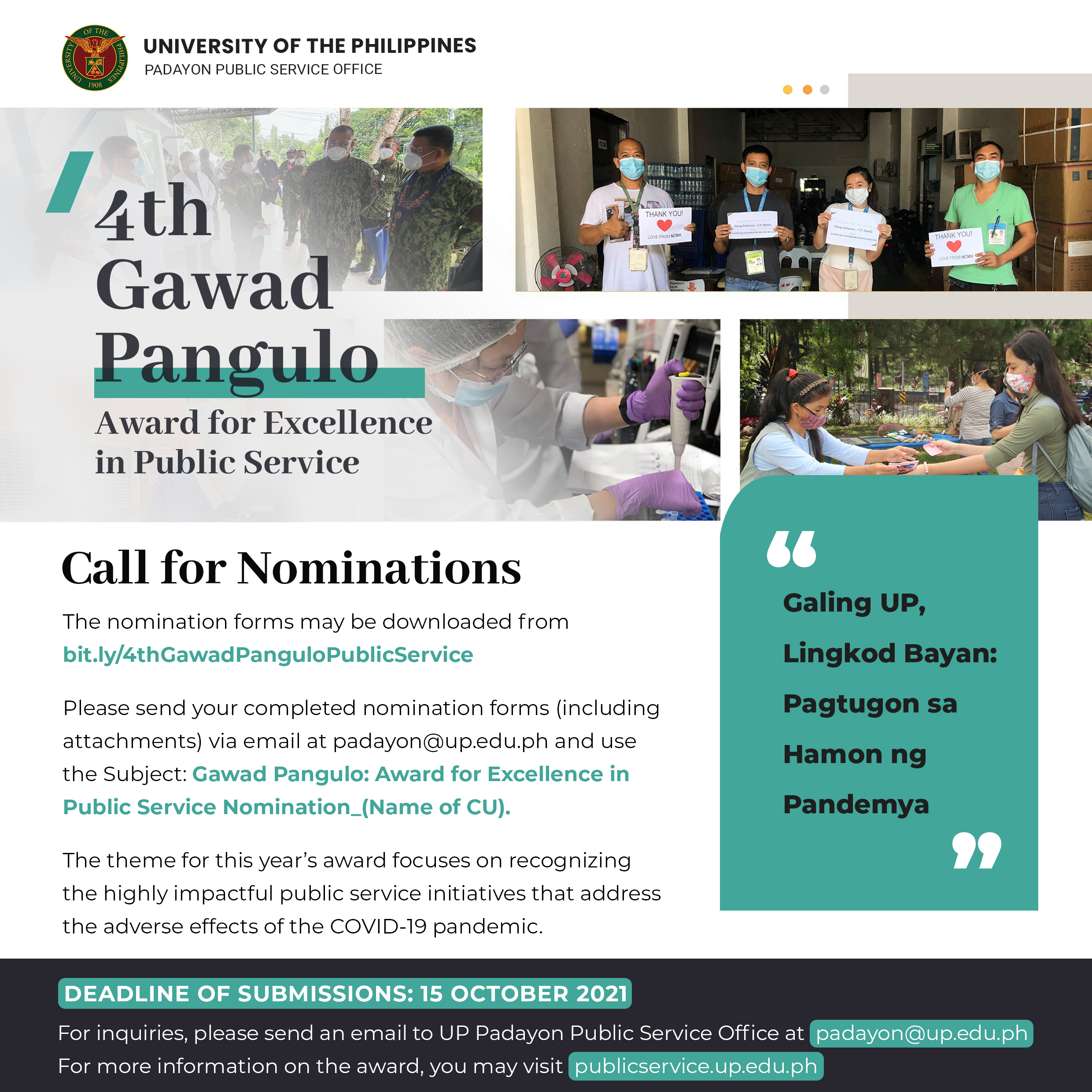Representatives from the camps of Vice President Leni Robredo, Manila Mayor Isko Moreno, and Senator Grace Poe will discuss campaign dynamics and strategies in an online forum to be moderated by Pia Hontiveros of CNN Philippines on October 13. “Kanya-kanyang Diskarte: Campaign Dynamics During the Pandemic,” will be the third webinar under the National Forum on Communication and Democracy: […]
Category: SYSTEM NEWS AND EVENTS
The UP NOAH launched its revamped website for a more user-friendly experience. The University of the Philippines Nationwide Operational Assessment of Hazards (UP-NOAH) is making good on its mission to build Filipino resilience against disaster. UP NOAH presented its revamped website on October 4, 2021, featuring a better interface from Mapbox that allows the […]
“It is really a numbers game. The pandemic is really a war on logistics,” Lim said in a Stop COVID Deaths online seminar hosted by the University of the Philippines (UP).
For context, last Sept. 16, the country had 21,261 new cases of COVID 19. This brought the total confirmed cases to 2,304,192 with 177,946 active cases, 2,090,228 recoveries, and 36,018 deaths.
The Philippine Genome Center will focus its efforts in the detection of COVID-19 variants in the country, with the scaling down of its testing operations for COVID-19 and expansion of genomic sequencing capacities in PGC Visayas and PGC Mindanao.
A university-based pandemic monitor pointed out a huge gap in the COVID-19 data that was too hard to ignore as it could result in misplaced policies and misinterpretation of the severity of the situation.
As medical doctors underscore the disconnect in the situation on the ground, data analytics from the University of the Philippines (UP) Pandemic Response Team (PRT) touch on the gap and delays between laboratory test results and the data published by the Department of Health (DOH).
Health advocate Dr. Gene Nisperos of Community Medicine Development Foundation said this could be a reason “we are losing the pandemic fight. We’ve fallen behind the enemy.”
The Quezon City Government has partnered with the University of the Philippines-Resilience Institute in developing a Drainage Master Plan (DMP) for the City.
Mayor Joy Belmonte revealed the good news in a chat message to Maharlika TV network (MTVN) saying that this landmark project only needs to integrate with the national government’s development plan before it will be executed.
The University of the Philippines, through the Padayon Public Service Office, has made the Call for Nominations to the fourth Gawad Pangulo: Award for Excellence in Public Service. This year’s theme, “Galing UP, Lingkod Bayan: Pagtugon sa Hamon ng Pandemya,” aims to award 15 excellent and outstanding COVID-related public service initiatives facilitated and implemented by faculty and staff in all UP Constituent Universities.
The study was led by Dr. Elena Pernia of the University of the Philippines Diliman College of Mass Communication and funded by the DoST-Philippine Council for Health Research and Development.
It presented an analysis of media, information materials produced by the Department of Health, audience reception and interpersonal information sources on dengue and Dengvaxia, and the influence of these sources on the trust and confidence in interventions for dengue and other immunization programs.
The UP System – Office of Alumni Relations (UPS-OAR) in partnership with the UP Information Technology Development Center (UP ITDC) has launched the Alumni Email Registration (AER) and Alumni Services to improve the quality of assistance it provides especially with the UP alumni. Both services can be found on UP Alumni website: https://alum.up.edu.ph/.
AER was launched in July 2021. Through AER, the UP alumni can now request for an alumni email account (@alum.up.edu.ph) online. Just visit the Alumni Website and click “Alumni Email Account” to register. Accomplish the form with your information and follow all the instructions afterwards to successfully complete your application.
The capacity of the Filipinos to undertake in-depth energy research on policies as well as technological innovations may eventually be enhanced, with the approval on the establishment of the proposed Philippine Energy Research and Policy Institute (PERPI) that will be attached to the University of the Philippines (UP), the premiere state university.
The proposed energy research body will source its funding from the government, based on the prescription of Republic Act 11572 or the law that underpinned the creation of PERPI.





